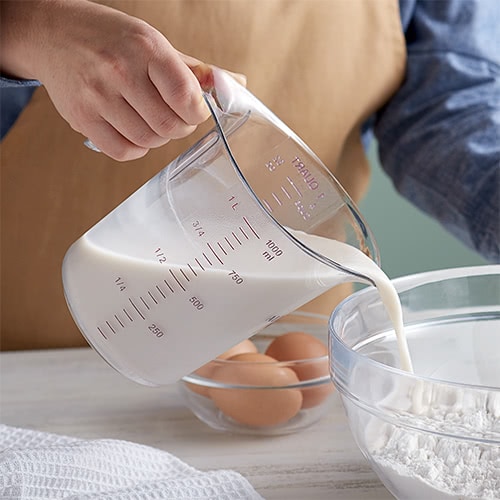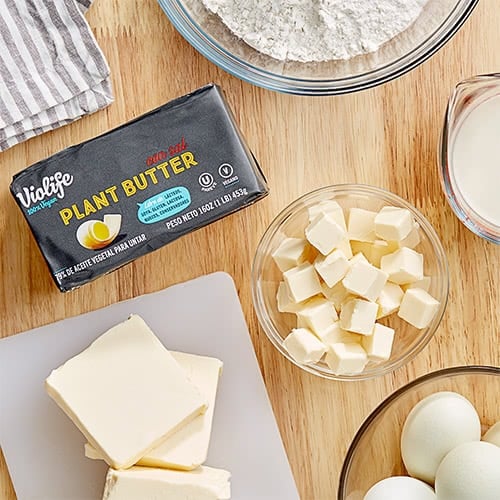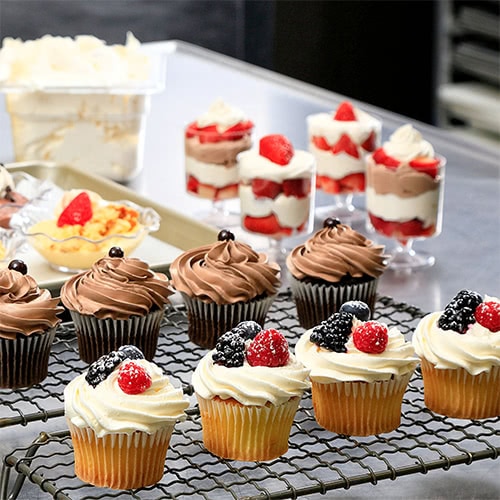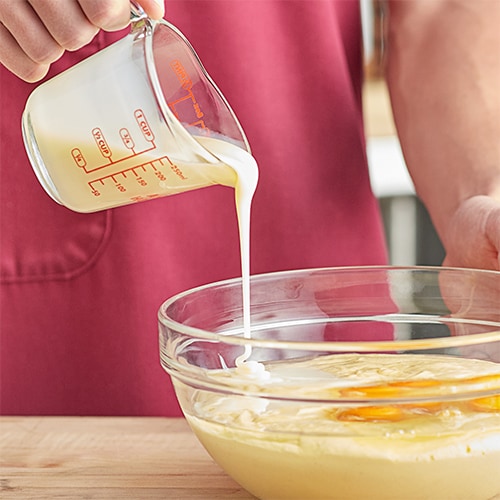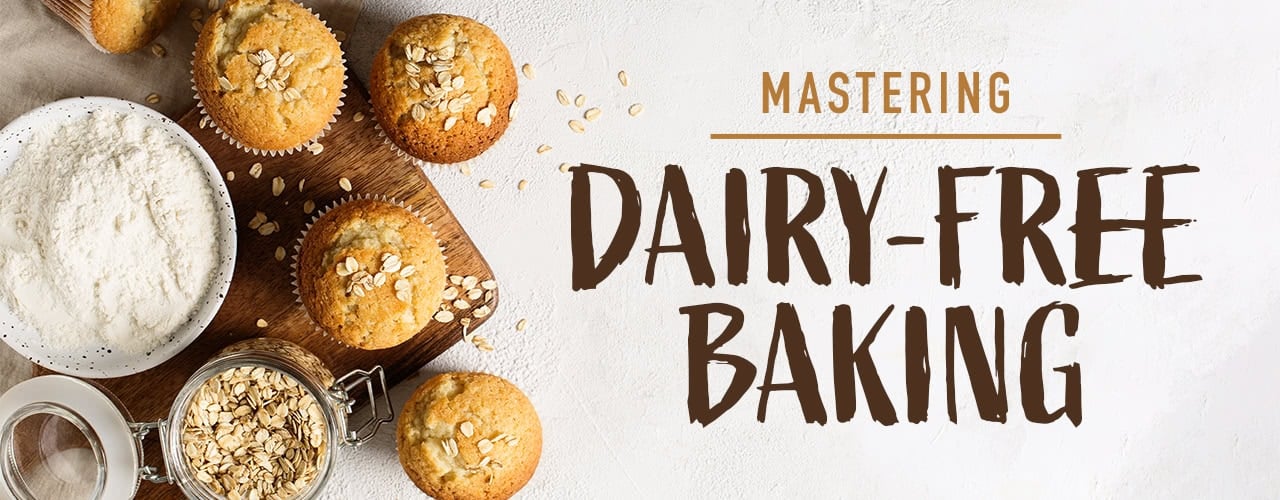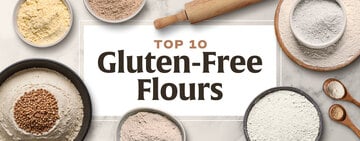Thanks to a growing awareness of celiac disease, trendy low-carb diets, and greater health consciousness, there is a huge market demand for gluten-free foods. Gluten-free flour does not taste or rise the way traditional flour does, so you must educate yourself before baking gluten-free. Whether you’re starting a gluten-free bakery or want to cater to alternative diets, we provide a list of the top 10 gluten-free flours on the market so that you can create delicious gluten-free foods. To mimic the effects of baking with glutinous wheat flour, gluten-free flours perform better when blended. While there are many premade gluten-free flour blends, this blog will focus on the common flours in those blends. Shop All Gluten-Free Flours Learn more about the top gluten-free flour options: 1. Almond Flour 2. Corn Flour 3. Rice Flour 4. Tapioca Flour 5. Oat Flour 6. Chickpea Flour 7. Coconut Flour 8. Buckwheat Flour 9. Teff Flour 10. Potato Flour 11. Best Gluten-Free Flour Brands Gluten Free Flour Substitutes Watch our video to discover the best gluten-free flour substitutes and tips from Webstaurant's test kitchen baker, Chef Meg, on how to use them. <iframe itemprop="embedURL" width="560" height="315" src="https://www.youtube.com/embed/OXHRIcv5Mw0?si=RIA-dOMFhnGuFMNl" frameborder="0" allowfullscreen></iframe> 1. Almond Flour Almond flour is a popular gluten-free flour alternative that is widely used in commercial kitchens and bakeries. Made from finely ground blanched almonds, almond flour has a light, nutty flavor accented by a subtle sweetness. Its rich yet unobtrusive taste makes it a versatile ingredient that can be used in both sweet and savory applications. It works well in recipes for cookies, cakes, muffins, and quick breads, adding a rich, moist texture to the final product. Almond flour can also be used as a coating for meats or as a thickening agent in sauces and gravies. Baking with almond flour requires some adjustments compared to traditional wheat flour. Almond flour is denser and moister than wheat flour, so it is often used in combination with other gluten-free flour or binding agents like xanthan gum to achieve the desired texture in baked goods. It is important to note that almond flour does not have the same rising properties as wheat flour, so additional leavening agents may be necessary. Because it adds more fat than traditional flour, which helps retain moisture, baking with almond flour extends the shelf life of your baked goods, making it a great ingredient if you plan to ship your baked goods. Almond flour tasting notes: Nutty, light, and sweet Almond flour shelf life: Unopened almond flour can last two to four months in the pantry and six to 12 months in the fridge. Opened almond flour should be used within a month. 2. Corn Flour Corn flour is a popular gluten-free flour derived from dried field corn kernels. It is typically a pale yellow color but can also be made from white corn. Not to be mistaken with cornmeal, corn flour is finely ground whereas cornmeal is coarsely ground. Some love the coarse, granular texture cornmeal adds to cornbread and fish fries, but if you want a softer product, corn flour is the better choice. It has a subtly sweet and nutty taste, making it a popular choice for both savory and sweet dishes. Corn flour is ideal for baking cornbread, muffins, pancakes, and biscuits. It can also be used as a coating for fried foods or as a thickening agent in soups, stews, and sauces. When baking, corn flour is often used in combination with other gluten-free flour varieties or binding agents such as xanthan gum or guar gum to mimic the elasticity and rise that gluten provides in traditional baking. Its fine texture and mild flavor provide a crumbly and tender crumb. Corn flour is closely related to polenta, coarsely ground yellow corn, which is used to make a cooked dish of the same name. It is also related to grits, coarsely ground white corn, and masa harina, ground corn treated with slaked lime. Unlike its sister products, corn flour is more finely ground and easier to bake with. Corn flour tasting notes: Sweet, corny, and nutty Corn flour shelf life: Corn flour will be at its best quality within the first year when kept in a cool, dark place away from heat and moisture. 3. Rice Flour Rice flour is a versatile gluten-free flour derived from finely milled rice grains. There are many different types of rice to turn into flour, but the three most common are white rice, brown rice, and sweet rice flour. Each variety has a different flavor. White rice flour has a fine texture and neutral flavor. Despite its name, sweet rice flour isn’t particularly sweet but rather has a mild, milky flavor. Brown rice flour offers nutty essences. To bake with rice flour, you must first choose your variety. In general, sweet rice flour is a great choice for baking because it retains moisture better than white rice flour. If you’re baking cookies, brown rice flour helps produce crispy cookies and avoids the greasy mess that can occur with gluten-free cookie making. White rice flour is best for making rice noodles and mochi. Rice flour tasting notes: Neutral (white rice flour), milky and mild (sweet rice flour), nutty (brown rice flour) Rice flour shelf life: Rice flour will last up to six months once opened. Storing it in the fridge or freezer will extend its shelf life. 4. Tapioca Flour Tapioca flour, also known as tapioca starch, is made from the starch of the cassava root. It is not to be mistaken for or used interchangeably with cassava flour. Cassava flour is made from the entire cassava root and will not behave the same as tapioca flour in baking. Tapioca flour is made by turning the cassava root into a wet pulp, washing the pulp to remove its starchy liquids, and then drying that liquid so that the tapioca starch remains. Thanks to its starchy nature, tapioca flour is an invaluable gluten-free baking flour, used to mimic the binding properties of gluten in recipes. In appearance, it’s nearly impossible to tell tapioca starch apart from other starches like potato and cornstarch. However, tapioca starch doesn’t clump as much as potato and corn starch, and it also behaves differently in baking. To bake with tapioca flour, use it in combination with another gluten-free flour such as almond flour, rice flour, or coconut flour to achieve the desired texture and flavor. It helps create a light and airy texture in baked goods, making it a popular choice for gluten-free breads, cakes, and pastries. Tapioca flour also creates stretchy, chewy baked goods, making it perfect for cookies, NY-style stretchy pizza crusts, bagels, and bread. It also adds a crispy quality, making it a favorite for baking pie crusts and cookies. Tapioca flour serves as a thickening agent in gluten-free sauces, soups, and gravies. Overall, tapioca flour is a versatile and essential ingredient for gluten-free baking, offering a neutral taste and excellent binding properties that help achieve delicious and satisfying results in a variety of recipes. Tapioca flour tasting notes: Taste and odorless; never discolors Tapioca flour shelf life: Unopened tapioca flour has a shelf life of one year and opened tapioca flour should be used within six to eight months for optimal quality. 5. Oat Flour Made from finely ground oats, the sweet, toasty, and nutty flavor of oat flour adds depth to your baked goods. Its texture resembles traditional wheat flour, making it a popular choice for gluten-free baking. Oat flour doesn’t require as much processing as wheat flour and contains a lot of soluble fiber, nutrients, and vitamins. Oat flour is particularly well-suited for baking items like cookies, muffins, pancakes, and quick breads. Its sweet flavor pairs well with ingredients like cinnamon, vanilla, and chocolate. Thanks to its caramelized, sweet flavor, you may need to reduce the sugar in your recipes. While you can use oat flour in savory applications, we would recommend choosing a different gluten-free flour from the list instead. You can substitute oat flour 1:1 for regular wheat flour in baked goods, but we recommend doing this by weight instead of volume; oat flour is softer and lighter than wheat flour. If measuring by volume instead of weight, then a good rule of thumb is to use 1 1/4 cups of oat flour for 1 cup of wheat flour. Although it’s less dense than wheat flour, oat flour has a higher absorption rate for liquids, resulting in a chewier and heavier texture. Because oat flour is gluten-free, it does not rise as much as wheat flour. However, there are strategies you can employ to overcome this limitation, such as increasing the amount of yeast or incorporating alternative additives. Additionally, the absence of gluten in oat flour necessitates the use of a binding agent to prevent the final product from becoming crumbly. Oat flour tasting notes: Mild, toasty, sweet, and nutty Oat flour shelf life: When stored correctly, unopened oat flour retains its quality for approximately one to two years. Opened oat flour stays fresh for up to six months but is at its best quality when consumed within the first few months of opening it. 6. Chickpea Flour Chickpea flour, also known as garbanzo bean flour or besan, is made from ground chickpeas. As one of the most nutritious flour alternatives available, it is a popular choice amongst health-conscious consumers. Chickpea flour has a nutty, earthy, and bean flavor. It adds a rich and savory taste to dishes, making it a great option for both sweet and savory recipes. Chickpea flour is commonly used in flatbreads, savory pancakes, and gluten-free pasta. When baking with chickpea flour, it is important to consider its unique characteristics. Chickpea flour has a high protein content, which helps provide structure and texture to baked goods. It also has a strong flavor, so it is best to use it in recipes that can complement or enhance its taste. While inherently savory in flavor, chickpea flour is fantastic for baking bread, muffins, and cakes when mixed with other gluten-free flour. Because it is naturally dense it helps bind ingredients together and provides these baked goods with a sturdy yet tender consistency. Chickpea flour tasting notes: “Beany”, nutty, and earthy Chickpea flour shelf life: When unopened, chickpea flour can last up to a year. Once opened you should consume it in the first six months, but you can extend its shelf life by storing it in the refrigerator or freezer. 7. Coconut Flour Coconut flour is a by-product of coconut milk production as manufacturers dry the leftover coconut meat at a low temperature for an extended period after extracting the coconut milk. Once dried, the coconut meat is finely ground into coconut flour. Coconut flour has a subtly sweet and nutty flavor, with a mild coconut aroma that adds a delightful tropical twist to baked goods. From breading chicken for coconut chicken tenders to baking a gluten-free pineapple upside-down cake, coconut flour’s flavor profile pairs well with both sweet and savory recipes. It’s a great alternative for those following a gluten-free diet or looking for a low-carb, nutrient-dense flour. When baking with coconut flour, we recommended using recipes specifically developed for it to ensure the right balance of moisture and structure. Coconut flour is highly absorbent and will sponge up liquids. Due to its unique properties, coconut flour typically requires more liquid and eggs in recipes to prevent a dry or crumbly texture. For optimal results, you can use coconut flour in combination with other flours or ingredients to achieve the desired texture in baked goods. Coconut flour can be an economical baking choice since you will require less of it than you would with another gluten-free flour. Still, there is no one-size-fits-all formula for substituting coconut flour for wheat flour. Just generally be prepared to reduce the amount of flour and increase the eggs and baking powder in the recipe. Coconut flour tasting notes: Mild, sweet coconut Coconut flour shelf life Regular, unopened coconut flour typically lasts 12 to 18 months at room temperature. Once opened and stored in the refrigerator, it will last three to six months. 8. Buckwheat Flour Buckwheat flour is derived from ground buckwheat groats, which are small, pyramid-shaped seeds. Despite its name, buckwheat is not related to wheat but is considered a “pseudo-grain” that is naturally gluten-free. Packed with protein and fiber, it’s a favorite amongst health-conscious consumers. Buckwheat flour has a distinct, nutty flavor that sets it apart from other gluten-free flour. Its earthy, slightly bitter flavor and dark color add depth to baked goods. For sweet recipes, buckwheat flour pairs well with nuts, caramel, chocolate, and baked fruit. In savory applications, buckwheat flour pairs well with cured meats, cheeses, capers, and sour cream. The hearty texture and nutty flavor of buckwheat make it an excellent choice for recipes that call for a more robust taste. However, it is important to note that its unique flavor can sometimes be overpowering if used in large quantities. To balance its flavor, consider blending buckwheat flour with other gluten-free flour, such as rice flour or almond flour. This combination can help create a more balanced taste while still benefiting from the nutritional value of buckwheat flour. Not just for diluting its flavor, blending buckwheat with other flours helps produce the ideal texture. Buckwheat adds moisture to cakes and tenderness to cookies, but if you use large amounts of it, then your cakes and quick bread will come out gummy. Buckwheat flour tasting notes: Nutty, earthly, slightly bitter Buckwheat flour shelf life Buckwheat flour lasts up to its best-by date when stored in a cool dry place (usually about a year). Once opened, it's at its best quality for a month in the pantry or three months in the fridge. 9. Teff Flour Teff is an ancient grain, native to East Africa. While only the size of a poppy seed, teff is packed with fiber, protein, and nutrients like iron. When ground into flour, teff has a deep brown color and earthy molasses-like flavor that adds depth to both sweet and savory baked goods. Teff flour is best suited for recipes that benefit from a hearty, nutty flavor; we love it in chocolate chip cookies, brownies, and mocha-flavored treats. Teff flour can also be used to make traditional Ethiopian dishes like injera, a spongy flatbread that is a staple in Ethiopian cuisine. When baking with teff flour, it is important to note that it is a dense flour with a high protein content, which can result in a heavier texture in baked goods. To achieve the best results, it is recommended to blend teff flour with lighter gluten-free flour like rice flour or tapioca flour. This combination helps to balance the texture and improve the overall structure of the baked goods. When making quick breads, pancakes, and muffins, we recommend only using 25% teff flour of the total amount of flour in the recipe. Teff flour is delicious in pancakes when combined with buckwheat flour and cinnamon. Teff flour tasting notes: Earthy, nutty, molasses Teff flour shelf life Unopened teff flour typically lasts up to a year. Once opened, it's good for around two months. 10. Potato Flour Made from peeled, dehydrated, and ground potatoes, potato flour is an alternative flour that is free from gluten. Potato flour contains more fiber than traditional flour, but it also contains more carbs and calories, so it isn’t the healthiest alternative flour option on the list. Potato flour is fine-textured and light beige colored. It has a mild flavor profile with earthy, potato essences. This makes it a delicious option for breading meat, producing a crispier crust than all-purpose flour. Potato flour must not be confused with potato starch; potato starch is a more refined product that chefs use as a thickening agent. You cannot use potato flour and potato starch interchangeably. Potato flour is known for its ability to provide moisture and tenderness to baked goods, making it an excellent choice for recipes that require a soft and moist texture. When baking with potato flour, it will absorb more liquid than traditional wheat flour. Therefore, it is recommended to adjust the liquid content in recipes when substituting potato flour. Potato flour can serve as a suitable replacement for all-purpose flour in recipes, although it is important to note that it does not have a 1:1 substitution ratio. For optimal results, it is recommended to substitute only a small portion, approximately 20%, of the total flour quantity specified in the recipe. To enhance the texture and flavor, consider combining potato flour with another alternative flour such as rice flour. You must also incorporate a binding agent into the mix since potato flour doesn’t contain any binding properties. Potato flour tasting notes: Neutral, earthy, potato-y Potato flour shelf life If unopened, potato flour can last up to two years past the date printed on its package when stored in a dark and cool environment. Once opened, if you store it in a tightly sealed container in a cool, dark place, then potato flour can last for up to eight months. Gluten-Free Flour Brands When choosing which gluten-free flour you want to purchase, you must also consider which brands offer the best prices and quality products. Catering to alternative diets can be both expensive and challenging as you attempt to create baked goods with alternative ingredients that mirror the original. These are some top gluten-free flour brands that offer affordable prices on high-quality gluten-free flour. 1. Bob's Red Mill Bob’s Red Mill offers some of the best 1:1 gluten-free baking flour mixes. If you want to remove the guesswork out of gluten-free baking, Bob’s Red Mill’s cup-for-cup replacement for all-purpose baking powder will yield consistently delicious gluten-free cakes, cookies, and quick bread. In addition to their 1:1 flours, they also offer high-quality single-source gluten-free flours like rice and oat flour. Sizes Available: 2 lb., 4 lb., 8 lb., 25 lb. Types: Almond Flour, Arrowroot Flour, Cassava Flour, Coconut Flour, Gluten-Free Flour Blends, Chickpea Flour, Millet Flour, Oat Flour, Potato Flour, Quinoa Flour, Rice Flour, Sorghum Flour, Tapioca Flour, Teff Flour Made in a Gluten-Free Facility: Yes See what our customers are saying about Bob's Red Mill gluten-free flours! 2. Rainforest Supply Rainforest Supply prides itself on providing 100% real products without any hidden sugars substitute sugars, fillers, gums, artificial flavors, or petroleum-based food dyes. Their gluten-free flours are no exception! You can feel confident in your purchase because Rainforest Supply products are sustainably and ethically sourced and registered with the US. FDA under the Federal Food, Drug, and Cosmetic Act. Sizes Available: 2 lb., 5 lb., 11 lb. Types: Oat powder, Amaranth powder, chia powder, quinoa powder Made in a Gluten-Free Facility: Yes See what our customers are saying about Rainforest Supply gluten-free flours! Back to Top By educating yourself on the top gluten-free flours and the best brands to purchase them from, you’re able to make an informed decision for your foodservice business. Whether you’re looking to create sweet or savory baked goods, there is a gluten-free flour option for every application. As the demand for gluten-free products grows, stocking up on some gluten-free flours will help you reach more customers.
